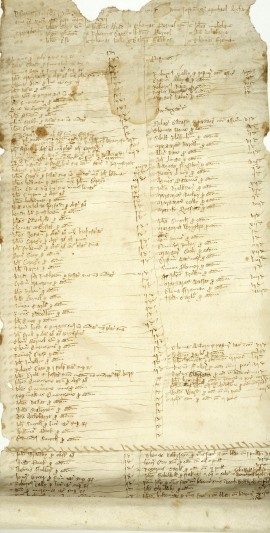The series of Godmanchester manorial records at Huntingdonshire Archives is of special interest for two reasons: first because it is one of the finest and most extensive of the county (including the enlarged modern county of Cambridgeshire), and secondly because the government of medieval Godmanchester was rather unusual: thanks to a 1212 charter of King John, the town, while not officially a borough until 1604, it operated as a self-governing manor answerable only for a fee-farm rent to the Crown. This important record of the administration of the manor was drawn up following a session of the manor’s leet court held on the Thursday before the feast St. Michael the Archangel in the twenty-second year of the reign of King Richard II (26 September 1398).
While most of the two sheets of parchment that form this roll are taken up with fines and penalties, they also contain additional useful information. Four ordinances enacted by the jury show Godmanchester’s collective decision-making in action, revealing matters of contemporary concern such as a prohibition on unauthorised vendors selling goods by the bushel in the town. On the back of the roll is a list of the town officials elected for the year. There is even evidence that the roll itself was used to keep track of fines paid and unpaid. Next to each entry on the face of the roll is a small symbol written in ink; the vast majority of these have been systematically scratched away, presumably indicating that the particular offender had cleared his or her debt.
The discovery and acquisition of an important document like this estreat roll would be welcome at any time but was especially fortuitous in 2012, when Godmanchester was celebrating the 800th anniversary of the original charter of King John that established the town as a self-governing body.
